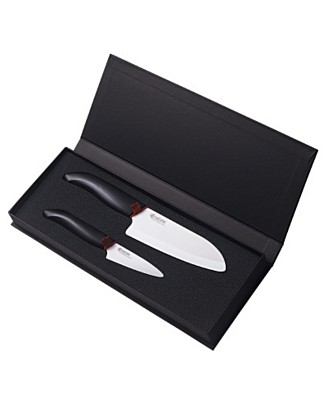Kyocera Corporation makes solar cells, telecommunications equipment, semiconductor packages and dental implants, among other products.
The common thread? Ceramics.
For the retail consumer, advanced ceramics offers ultra-sharp, precise kitchen knives.
Unlike metal, ceramic blades (usually made from zirconia) will never rust, and their edge will stay sharp up to ten times longer than steel.
 Chemical inertness makes them impervious to smells and stains.
Chemical inertness makes them impervious to smells and stains.
Additionally, ceramic weighs much less than metal, resulting in a knife that is easy to wield with precision.
On the other hand, some feel they are more trouble than they are worth.
Sharpening can only be accomplished with diamond-based sharpeners, and the blade is extremely brittle.
The knife will shatter like glass if dropped on a hard surface. Attempting to cut through bone or frozen materials can cause splintering. Using the knife in a twisting or prying motion can cause it to snap.
Black blades that have gone through an extra hot firing process are somewhat tougher (and very elegant).
Though more expensive than traditional knives, the accuracy of ceramic knives makes them downright fun to use.
And at only $25, there’s no excuse to skip the mandoline for easy homemade potato chips.

The best thing about ceramic knives is that when you cut cabbage you retain vitamin C that would be lost when cutting with a steel blade. But then plastic lettuce knives work fine for that too.
If I could produce like this I would be properly chuffed